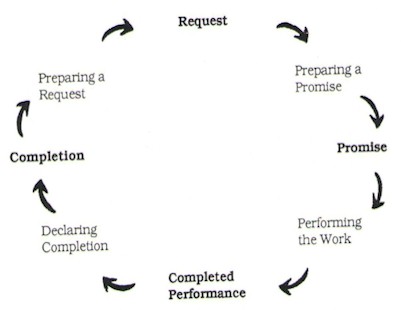|
Business Process Design
-
The Art of Consulting As An Epidemiologist
One of the pleasures of working as an epidemiologist is the amount
of learning you undergo in other fields in order to practice
epidemiology. So it is with the business of epidemiologic
consulting. Business theorists, like linguistics theorists,
speaker of four steps (or speech acts) in the design of the
business process - a design that brings business full- circle,
completes the process, and brings business back. Linguists speak
of requests, promises, performatives, and declarations as
fundamental speech acts. These are also the fundamental processes
of epidemiological consulting, as they are of business itself.
Doing the job is often the least of the work; attention paid to
the preparation of each phase will help ensure success. Many
projects where the work is done correctly are nonetheless failed
projects, because of the lack of attention to the four phases.
Preparing a Request
Prospective clients generally know their concerns but often do not
know what an epidemiologist does and how he/she can help them
satisfy their concerns. During this phase, the epidemiologist's
role is to understand the client's concern and to teach the client
how to ask an epidemiological question that addresses their
particular concern.
|
 |
|
Preparing a Promise
Not all epidemiological requests can be handled by every
epidemiologist or every epidemiological group. We each have our
areas of refined skills. Elements of a full promise include the
capacity to complete the project at the skill level required, by
the time specified, presented in the manner necessary, and within
financial bounds feasible for the client. Each aspect should be
included within the promise made to the client while the
epidemiologist can promise sound work that meets the standards of
professional rigor, one cannot promise the results of one's study
or what effect the knowledge of those results will have on others.
Performing the Work
Consultants generally have years of experience "doing the work"
prior to entering the consulting field. They bring their skills
with them and do not foresee problems in practicing them
elsewhere. Consultants frequently enter the private sector
expecting to practice the same procedures they used in the public
or academic sectors, frequently lacking the resources that were
previously available to them. The performance standards include
both professional quality and those specified above (the element
of the full promise). Furthermore, if the feasibility of
conducting specific aspects of the project change over time, the
client must know how they will affect the original promise.
Declaring a Completion
Performing the work does not alone complete the project.
Completion of the project includes the delivery of a report in a
form that the client can understand and use, the mutual
fulfillment of financial obligations, and, most importantly, the
ascertainment of the client satisfaction. The form of the report
will depend on the forum in which it is to be presented. The
client may desire That the results of the study be presented to a
number of different audiences. Thus, delivery of report may take
several forms simultaneously. Additionally, all clients have their
clients - a boss, an organization, a funding source. The
consultant must listen for, and respond to, both the concerns of
the clients and those of the client's clients. The declaration by
the client of completion of the project, and satisfaction with
that completion, opens up the opportunity for the assessment of
subsequent needs.
We've described the four phases of the business design process of
consultants as we see it and practice it. Some consultants
specialize in specific phases of this process, while others (like
ourselves) have designed their services to include the full
circle. What one wants to offer in the marketplace depends on
one's own skills and one's personal preferences. As the general
community becomes more familiar with the power of epidemiology to
produce comprehension and direction in areas of uncertainty, the
demand for epidemiological consulting services will increase both
in breadth and depth. Understanding the design of business
processes allows one to choose both those services one wishes to
provide, and those one does not. Opportunities exist to specialize
in any of these phases or to service all, independent of the area
of specific technical knowledge.
Stephen H. Lamm, M.D.
Consultants in Epidemiology & Occupational Health, Inc.
|